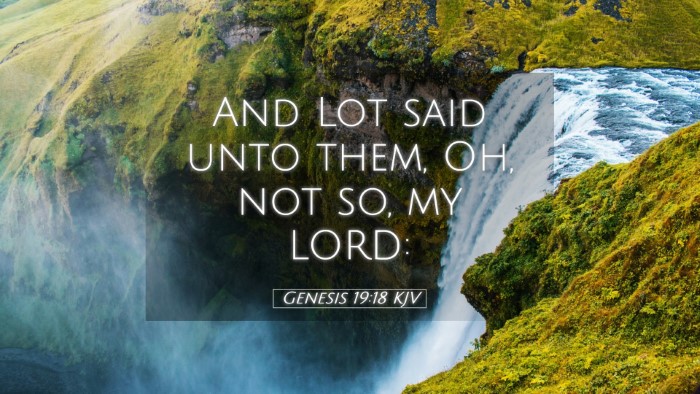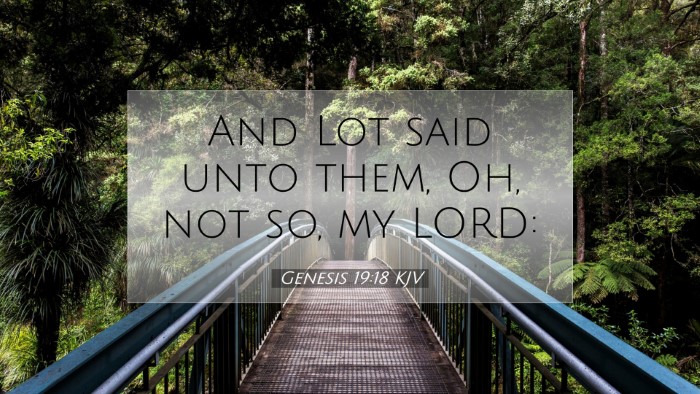Commentary on Genesis 19:18
Genesis 19:18 states: "And Lot said unto them, Oh, not so, my Lord." This verse captures a critical moment during the destruction of Sodom and Gomorrah, depicting Lot’s conversation with the angels who had come to deliver him and his family from the impending disaster.
Contextual Background
In order to appreciate the gravity of Lot's statement, it is essential to understand the broader narrative within Genesis. The destruction of Sodom and Gomorrah represents a pivotal event that illustrates the consequences of sin and the diligence of divine intervention.
Historical Context
According to Albert Barnes, the cities of the plain had become a stark symbol of immorality, which ultimately led to their demise. The accounting of their fate underscores themes of divine judgment, mercy, and the tension between justice and compassion.
Analysis of Lot’s Plea
Lot's plea, as depicted in this verse, reveals much about his character and his perspective in a precarious situation.
Lot’s Character
Matthew Henry comments on Lot, noting that he had been significantly affected by the surroundings of Sodom. He highlights that Lot was vexed by the wickedness of the city yet chose to remain there, reflecting a tension in his character. While he was a man of faith, his attachment to the city and its comforts complicated his spiritual walk.
Emotional Appeal
In his response, Lot addresses the angels with a tone of reverence that suggests he recognizes their authority. His use of the term "Lord" signifies an acknowledgment of their divine power. This emotional appeal illustrates Lot's desperation for mercy and reveals his reluctance to leave all that he knows behind.
Theological Insights
Several theological themes arise from Lot's interaction with the angels, particularly concerning God’s mercy and justice.
Divine Mercy
Adam Clarke elaborates on the concept of divine mercy as shown in this narrative. The angels represent God’s patience and willingness to save even the most compromised of believers. Lot's plea indicates the ongoing possibility for salvation, highlighting God's desire to save those who seek refuge in Him.
Judgment and Deliverance
The contrast between the impending destruction and Lot’s plea introduces the theme of divine judgment. This relates to early Christian theology where the dichotomy of salvation versus destruction remains a critical discussion point.
- The need for deliverance: Lot’s hesitance symbolizes the struggle between worldly attachments and the call to follow God.
- The urgency of the situation: Lot's conversation suggests an understanding that time is running out, reflecting the urgency that often accompanies divine commands.
Practical Application
For pastors and theologians, Lot’s interaction with the angels provides meaningful lessons on obedience and faith amid trials.
Lessons on Obedience
Lot’s initial reluctance exemplifies the common struggle between recognizing God’s call and the hesitation to leave behind familiar comforts. This speaks to the pastoral need to encourage congregants to trust in God’s plans, even when they require significant sacrifices.
Faith in Action
Lot's plea can encourage believers to consider how they approach their own journeys of faith. Reflection on one's attachment to worldly comforts versus the call of God is crucial for spiritual growth. Pastors can utilize this narrative to foster discussions around the cost of discipleship and the importance of prioritizing faith.)
In conclusion, Genesis 19:18 serves as a poignant reminder of the interplay between human frailty, divine mercy, and the serious implications of moral living. Lot’s plea not only exposes his struggle but also illustrates the broader narrative of grace at work amid judgment.


